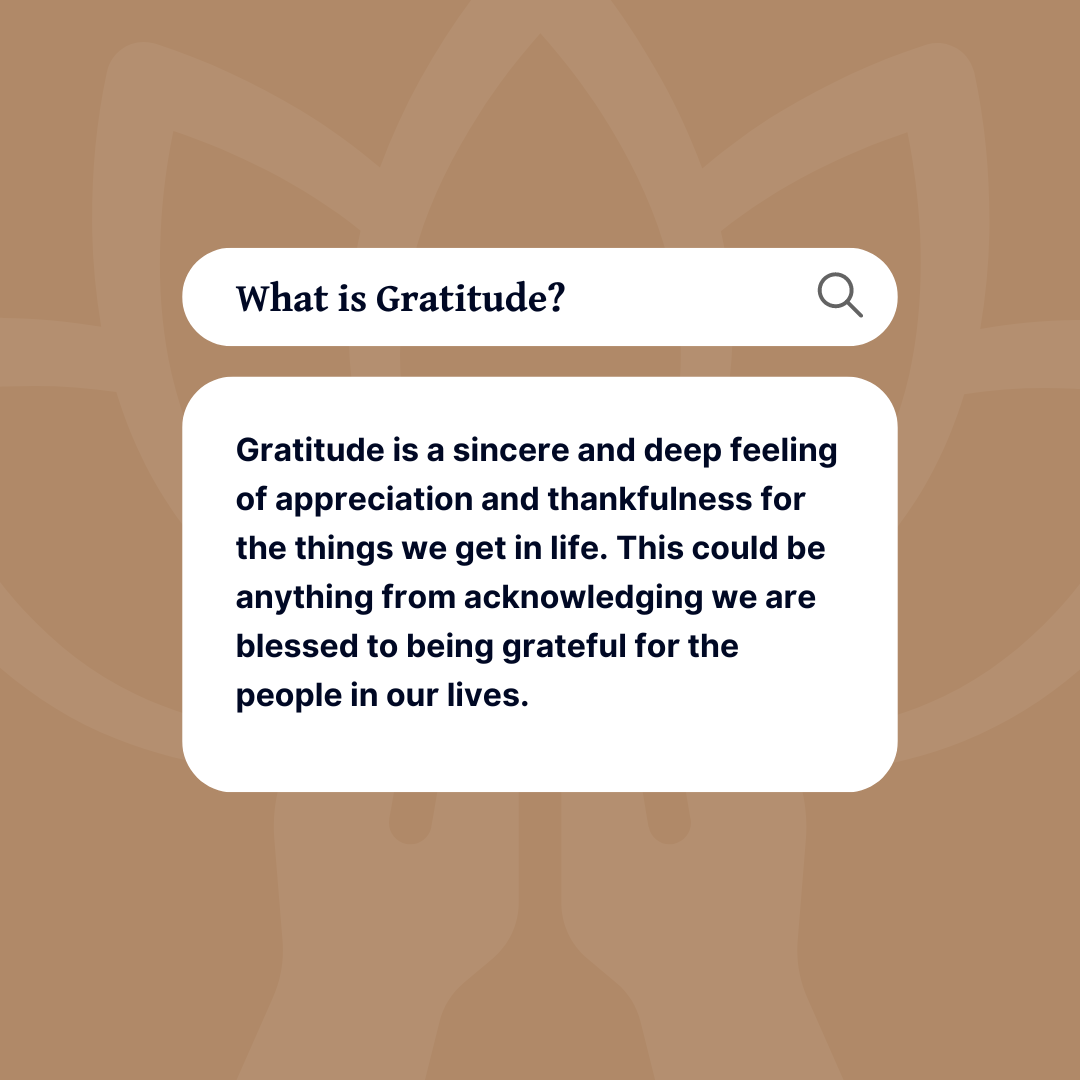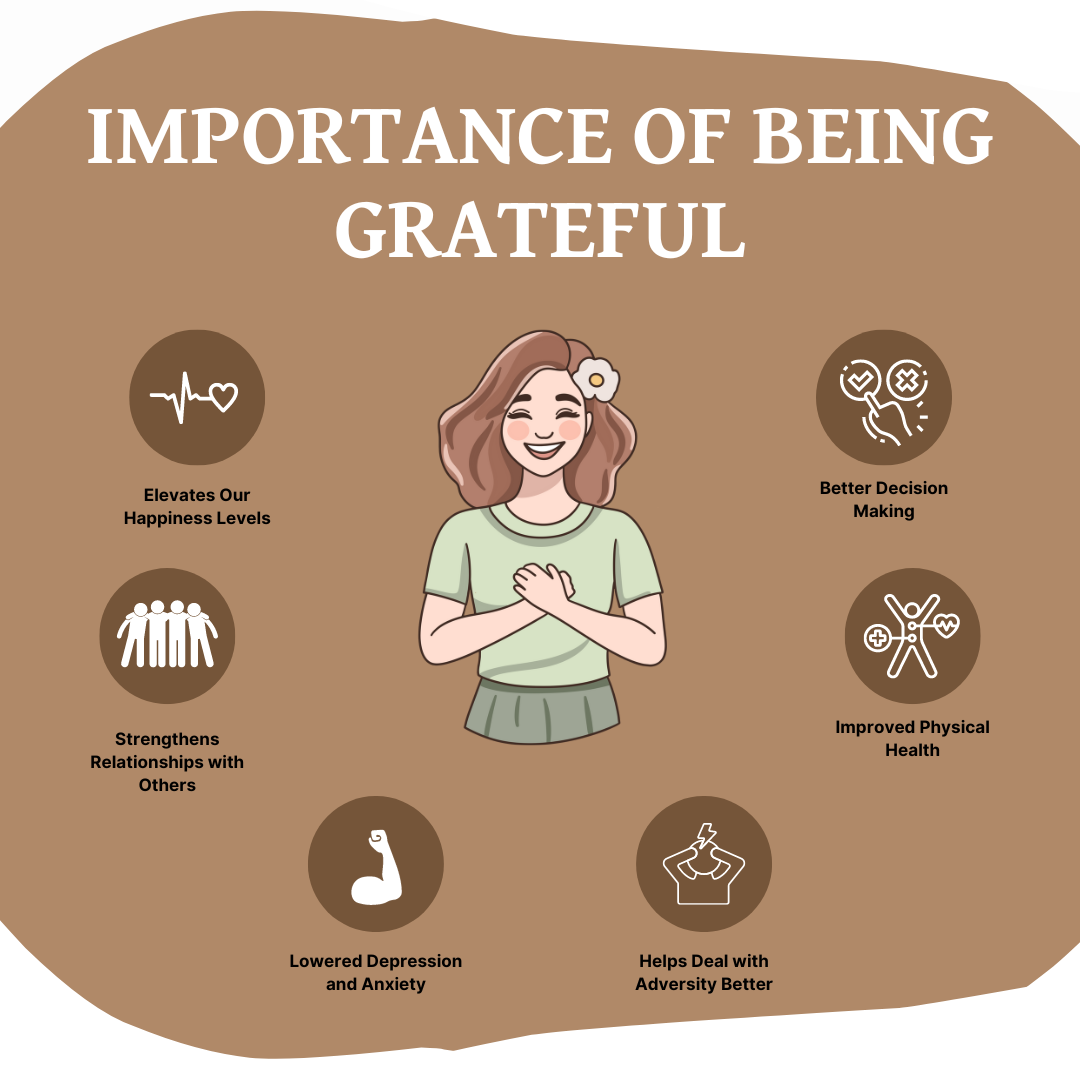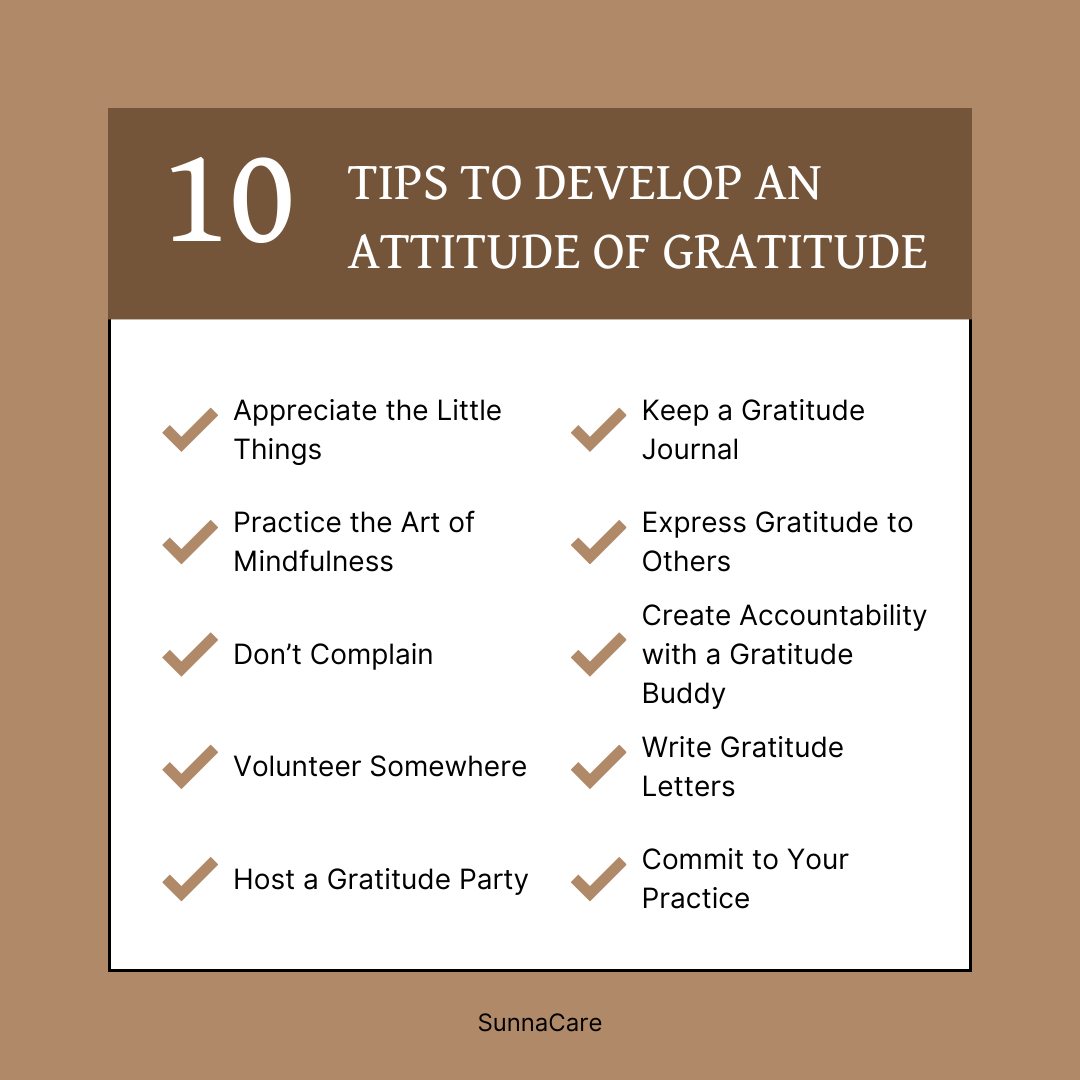How to Develop an Attitude of Gratitude in 10 Steps
How to Develop an Attitude of Gratitude in 10 Steps
How to Develop an Attitude of Gratitude in 10 Steps
How to Develop an Attitude of Gratitude in 10 Steps
We are living in the age of information overload and anxiety, with 4% of the global population having an anxiety disorder. The number only keeps on increasing, and now is the time to care for our mental health more than ever.
One way to reduce anxiety is by having an attitude of gratitude. Gratefulness is the ability to appreciate everything life has to offer and develop a positive attitude.
But, how can you cultivate such a mindset? Our coaches have created a guide for you to help you cultivate an attitude of gratitude this year.
What is Gratitude?

Gratitude is a sincere and deep feeling of appreciation and thankfulness for the things we get in life. This could be anything from acknowledging we are blessed to being grateful for the people in our lives.
It is an emotion along with a positive attitude that allows us to have an attitude of appreciation for everyone and everything. Throughout the world, many cultures talk about cultivating an attitude of gratitude.
There are also rituals around this practice, such as the Holy Month of Ramadan. In the month of Ramadan, Muslims show appreciation for things in life that they might otherwise take for granted such as food, and drink. Muslims do this by abstaining from food and drink voluntarily, from sunrise to sunset.
The Importance of Having a Gratitude Practice in Life

Having a gratitude practice in life means you focus on the smallest of things and remain thankful. This can be something as small as having access to clean water or a roof over your head.
However, the benefits of a gratitude practice are not just for theoretical purposes. These benefits are also backed by science as more and more research goes into having an attitude of gratitude.
So, here is what the science says on why having a gratitude practice is important:
Elevates Our Happiness Levels
One of the top benefits of gratefulness is that it gives a positive boost to your mood. If you are struggling with negative emotions, we suggest you bring out a pen and paper and begin listing the good things in life.
When you express this formal practice of thanks, your brain releases serotonin and dopamine, which are happiness hormones that provide you with a bursts of joy.
In the long run, this will help you rewire your brain as you develop an attitude of thanks.
Better Decision Making
When you engage with an attitude of gratitude, you might not make the connection that the practice would improve your decision making. However, having a gratitude practice is shown to help with sound decision making.
As you practice gratitude, you tend to see the positive in your surroundings and circumstances. When adapting a positive outlook, you will feel less in need of instant gratification and general short-term oriented behaviors. With a reduction in craving short-term gratification, your brain is more likely to make better decisions because you will be prioritizing long-term rewards. In general, long-term grounded thinking makes for better decision making than short-term oriented thinking.
Even a few studies have shown that people who practice gratitude are better at decision-making because they are not as impatient.
Strengthened Relationships with Others
Cultivating an attitude of gratitude can help you strengthen your relationships with your loved ones. When you remember the good your relationships do for you, you are more grateful and appreciative of the people in your life.
When you appreciate others, they will (generally) appreciate you back, which can create a cycle of gratitude. However, this is not just limited to your personal life, as gratefulness in the workplace can also have a positive impact.
People who take the time to thank their partner feel more positive toward them and are also comfortable expressing any concerns regarding the relationship.
Improved Physical Health
The mind and body are connected, which is why your mindset impacts your physical health, too. Gratefulness leads to more energy, less stress, improved sleep, and more.
When you develop an attitude of gratitude, you will feel more at ease in life, which will help your body feel better as well.
A study also showed that students who kept a gratitude journal for two weeks reported less physical ailments, such as headaches and the like, than the group that were asked to keep a journal of negative events.
We recommend you also cultivate the practice of gratitude in your life to feel better.
Lowered Depression and Anxiety
Gratitude doesn’t just improve your physical health; it also has a positive impact on your overall mental health. Cultivating an attitude of gratitude will help you focus on the positives in your life and help you recover from anxiety and depression.
Gratitude decreases the production of stress hormones. Gratefulness will help you feel at ease, which will reduce the production of cortisol and allow you to appreciate life more.
On days when you aren’t feeling so good, we recommend you begin listing the things for which you are grateful. Doing this will improve your mood and make you feel better.
Helps Deal with Adversity Better
Finally, an attitude of gratitude can help you face the challenges of life with ease. It will help you focus your brain on the positives, which will provide you with the strength you need to deal with the curveballs that life throws your way.
Even research has proven that people who practice gratitude experience better coping skills and resilience.
How to Develop an Attitude of Gratitude: 10 Tips that Work

Now that you understand the benefits of having an attitude of gratitude, it is important to develop this attitude in your life.
If you want to feel better, remain happy, and overcome life’s challenges, then here is everything you need to know about how you can develop an attitude of gratitude:
1. Appreciate the Little Things
The big things are a small part of life. Most of our life is made up of small moments that we may forget to appreciate.
We recommend you take note of the small things in your life and become grateful for them daily. This will help you adopt a mindset of gratitude that will positively impact other parts of your life.
It will also help you develop an active attitude. This means that you will actively look for ways to remain thankful and express your appreciation.
By appreciating everything you have in your life, you will become even happier and more positive. In the long run, you will also attract people with the same mindset.
2. Keep a Gratitude Journal
Once you develop a gratitude mindset, it is time to look for ways to be grateful and keep a journal. It doesn’t mean that you just create a list of things without reflection.
Instead, you can begin this practice by writing down the things you look forward to in your day or a few positive things that happened to you during the day. The idea behind this is to ensure your brain dwells on the positives rather than the negatives.
If this sounds a little overwhelming, we recommend starting small and only listing five positive things from your day. As you practice this more and more, you will find many more positive things in your daily life, leading to an attitude of gratitude.
3. Practice the Art of Mindfulness
Practicing mindfulness will allow you to be present in the moment and keep you grounded in the moment in time. There are various ways you can practice mindfulness.
These can include the following:
- Deep breathing
- Going out in nature
- Meditating
- Doing a creative activity
- And much more
Anything that will help you stay in the now can be practiced as mindfulness to help you appreciate the moment as it is taking place, and notice the good in it.
4. Express Gratitude to Others
While writing things you are grateful for is great, it is also just as important to express how grateful you feel. If you want to develop an attitude of gratitude, then you must make it a habit to express it.
For example, you can thank your coworkers, friends, family members, or even strangers that you interact with. It is important to be specific so that the other person knows what you appreciate.
Once you do, you will also be more mindful of how other people make you feel, and what they do that makes you happy. This will also strengthen the bond you have with your support system.
5. Don’t Complain
Many people complain daily without even realizing what they are doing. You might complain about the weather, your workplace, or anything else that is a regular part of your day.
However, the downside to complaining is that when you indulge in it, you are reinforcing the negative emotions and reliving the frustration and stress of what you complain about.
We understand that this can be difficult. So, the next time you find yourself about to complain, you must stop yourself right there and replace the dialogue with something positive.
It will take some time but as you begin practicing this, you will feel more positive about things happening in your life and what you should be grateful for.
6. Create Accountability with a Gratitude Buddy
If you find it challenging to create an attitude of gratitude, then we recommend you create some accountability with a friend. Both of you can share your daily gratitude through a quick chat.
You can check in with one another about the things for which you are thankful. In the long run, this practice will hold both of you accountable and strengthen your bond and friendship.
7. Volunteer Somewhere
Giving back or doing for others creates an attitude of gratitude for you and the receiver. Partaking in such activities is also a great way to remind yourself how fortunate you are and how other people are in need.
You will realize how privileged you are, and it will make you feel grateful for the things you do have in your life, even if it doesn’t feel that way sometimes. So, find a local shelter or community in your area that requires volunteering and get in the spirit of giving.
8. Write Gratitude Letters
Some people are better at writing their feelings than verbal expression. If you fall under this category, we recommend writing letters to express how grateful you feel.
For example, you can write a letter to a loved one addressing them directly and letting them know how grateful you are for their presence. You don’t even need to send the letter if you feel like it, as writing it will help you feel more gratitude and positivity.
On the other hand, you can also deliver these letters to the people you have written them to so you can both share these positive feelings.
9. Host a Gratitude Party
Share your practice with your friends and host a gratitude party for your loved ones. Do it at any time of the year and include gratitude games and much more to make the party full of life.
Be sure that the party is intimate so everyone knows one another and can be comfortable expressing gratitude to one another. In the end, you can give everyone a souvenir to remember this by and be grateful for such a wholesome event.
10. Commit to Your Practice
Finally, cultivating an attitude of gratitude is not so easy, which is why it is crucial to commit to your practice. There are many things you can do to stay committed.
For example, you can implement the following guidelines to stay committed to your gratitude practice:
- Set daily reminders on your smartphone to commit to your practice
- Keep an accountability buddy to check in with daily
- Start small to ensure you stay on track
- Create a schedule for practicing gratitude and stick to it
All of these things will help you stay on track. If there are days you forget your practice or don’t have time, that is okay too.
Don’t be too hard on yourself, and if you forget about it one day, then be sure to pick up your practice the next day.
Final Thoughts
These are the top ten tips you can implement in your life starting today to cultivate an attitude of gratitude. As you begin implementing this practice, you will feel happier and thankful each day.
On the other hand, if you are going through troubling times, you can always get in touch with our Muslim coaches in Canada. We can provide you with the practice and strength you need in turbulent times.



